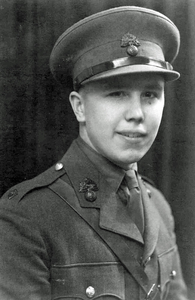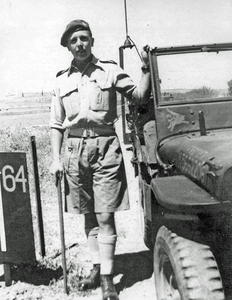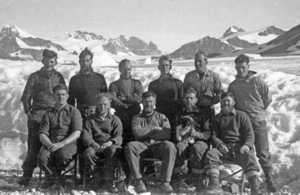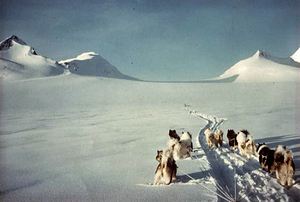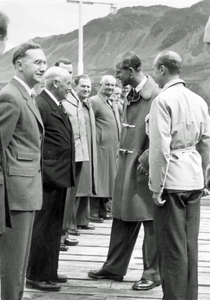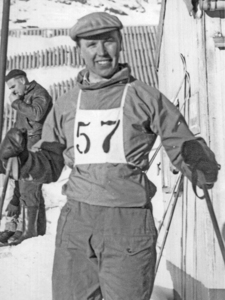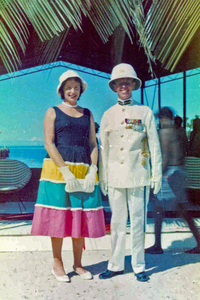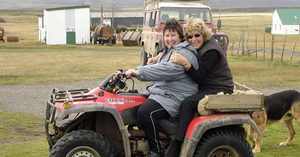SPIVEY, ROBERT EDWARD
1921-1994 from England
paratrooper, quartermaster for the Falkland Islands Dependencies Survey (FIDS), magistrate on South Georgia, and colonial administrator, was born in Chelsea on 25 March 1921 to Edward Walter Spivey (a publisher’s bookbinder) and Elsie Spivey (née Pearce). He attended Bushey Preparatory School, West Wimbledon, from 1926 to 1932 and Merton Central C of E School, Merton Park, Surrey from 1932 to 1937. After matriculating Spivey was employed as a stockbroker’s clerk (known as a ‘Bluebutton’) with Sir Basil Montgomery & Co, Stock and Shares Brokers, from 1937 to 1939. He joined the Stock Exchange Company of the 1st Cadet Battalion, Royal Fusiliers.
At the start of World War II, he joined the territorial army as a private soldier in the Royal West Kent Regiment. In 1940 he was commissioned (a regular commission, not a ‘wartime/hostilities only’ commission) into the Royal Fusiliers. He completed a commando course in Argyllshire and then became an instructor at the Army Battle School, at Salisbury.
Spivey then volunteered to join the airborne forces and ultimately the Parachute Regiment, (21st Parachute Regiment) and he was selected as a platoon commander for the newly-formed, and elite, 21st Independent Parachute Pathfinder Company – which specialised in low-level parachuting to secure dropping zones for the main force. During his service with the Parachute Regiment, he saw action in North Africa, Sicily, Italy and most notably at Arnhem.
During his service in Norway, after VE Day, his company were responsible for rounding up Nazi war criminals. He was ‘mentioned in despatches’ on 10 May 1945 for his gallantry in action in September 1944 at Arnhem, Netherlands during 'Operation Market Garden'. He was promoted major at the relatively young age of 24. After the War, he saw service in Palestine during the last days of the British Mandate, where he lost more men from his company than were killed at Arnhem. He also served in the Arab Legion. During his time in the Middle East he was member of King Abdullah of Transjordan's personal bodyguard. Spivey also saw service with a Gurkha regiment.
In 1947 Spivey joined FIDS as a general assistant, and was appointed to serve for one year at Base ‘E’ on Stonington Island in Marguerite Bay. He became one of the so-called ‘Lost Eleven’ because the relief ship John Biscoe was unable to enter Marguerite Bay, at the end of the season due to heavy ice conditions - so the shore party had to spend a second, involuntary, winter at the base. Vivian FUCHS, the base commander at Base ‘E’, appointed Spivey as quartermaster in charge of provisions and clothing, and by common agreement he did this with utmost fairness and humour. Amongst those serving at Base ‘E’ were John HUCKLE, Bernard Stonehouse and Surgeon Lieutenant David Dalglish, Royal Navy.
Dalglish later went on to have a very distinguished naval career - becoming the Surgeon Captain onboard HMY Britannia, and before retirement he was Deputy Director of Naval Medical Services. He was awarded the Polar Medal with Bar. Dalglish and Spivey became firm friends and together they undertook two long winter sledging survey expeditions with a team of nine huskies. The first was around George VI Sound, from September to December 1949 while the second lasted 56 days and covered a further 500 miles of coastline.
On completion of his service with FIDS in 1950 Spivey returned to the UK where he was a lecturer on polar subjects at the Royal Commonwealth Society and Institute from 1951 to 1953. Also in 1953, he became the agent for the British North Greenland Expedition 1953, overseeing the aerial dropping of supplies.
Spivey, at the age 32, single and living at Avondale Gardens, Hounslow, Middlesex, was selected on probation as administrative officer in South Georgia, in succession to Kenelm PIERCE-BUTLER. He sailed for Montevideo on 15 January, travelling on to Stanley where he arrived on 11 February 1954.
Spivey served as Magistrate and Administrator in South Georgia 1954-1957. In 1955 he was awarded the Polar Medal.
Jan Cheek was a child living on South Georgia during Spivey’s time as Magistrate (her father was Basil BIGGS – policeman/handyman. See Image 1414) She has vivid memories of Spivey:
'I was only around six at the time Spivey arrived and nine when he left. He was sociable and hospitable … I remember this because he included us, the only three children there at that time, in parties for visiting officials. With hindsight that was doubly kind, first we were fairly scruffy little urchins and secondly it enabled my mother to attend. An exception was the Duke of Edinburgh's visit where royal protocol meant that we had to greet him roped off on the other side of the jetty and could not attend the reception.
Spivey also made an attempt to formalise our education as the Falkland Islands Government failed to send promised books and materials when we had exhausted those that we had taken with us. Unfortunately, he underestimated the challenge of engaging the attention of quite bright primary age children and after a couple of sessions seated a very shiny dining table doing tasks, we felt well below our capability we ‘took to the hills’ and could not be found at lesson time.’
On Christmas Day 1955, at 4am in the morning, Spivey was on the jetty at Grytviken to welcome scientific team members from the International Geophysical Year expedition: ‘he welcomed members of my team with a tray of glasses of champagne cocktails – what a memorable welcome!'. (David Dalglish).
Spivey was serving on South Georgia as Administrator in 1957 when HRH PRINCE PHILIP, Duke of EDINBURGH, visited the island.
Spivey was highly regarded by the civil authorities in Stanley. In a letter dated 24 April 1956 from Governor ARTHUR to A D Garson, Overseas Service Division, he wrote:
‘…the post of Administrative Officer, South Georgia. This post has always been a headache to us because it is something of a dead end. Although it’s quite a pleasant place to live in for a short time, and even an interesting one especially if you take an interest in winter sports or natural history, it is not a place in which a man wants to spend his whole career, and although the post is permanent and pensionable, in fact we can never fill it permanently…the salary is now £900 a year flat plus £100 entertainment allowance. You will note that the officer virtually lives free getting food, quarters, light and fuel free. The house is a good one and a wife could live there…I have communicated with Spivey, and he is prepared to take a chance as to which Colony he would first be posted to. Spivey is first-rate chap and would make a good District Officer … He had a magnificent record during the war as a parachutist and was one of the survivors of Arnhem…His appointment expires in February next year’.
On completion of his contract, Spivey travelled from South Georgia to Stanley in the RRS John Biscoe, then on to Montevideo in the RRS Shackleton. He arrived back in England on 3 June 1957.
During his time in the Falklands and South Georgia Spivey met Irene Una Sedgwick. She was born to Lawrence and Irene Isabella Sedgwick on 16 August 1931. The Sedgwick family lived on Fitzroy Road in Stanley and ran the McAtasney & Sedgwick Falklands Store. In 1945 she moved to London to complete her last four years of secondary schooling at Putney High School.
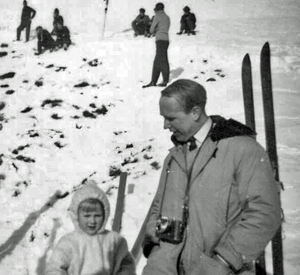
Spivey and Coleen BIGGS at Husvik...
On her return to the Falklands, Una Sedgwick became secretary to Governor Miles CLIFFORD from 1949-1951, with particular responsibility for the administration of FIDS and this was how she first met Robert Spivey. Una was one of the passengers on the northbound Aquila flying boat flight to the UK in April 1952, when she accompanied her father for a hospital visit
In 1960, while in England, Una was invited to drinks on board HMY Britannia by Surgeon Captain David Dalglish. Most importantly Spivey was also at this function – so Una was reunited with him and the couple were married that year on 27 February 1960 at Broadstone, Dorset.. They had three children – Candida (b.1960), Robert (b.1964) and Katherine (b.1967).
On 7 February 1958 Spivey was appointed Administrative Officer, Western Pacific High Commission (British Solomon Islands).He started work at Gizo, before moving to Auki. The Spivey family later moved to the Anglo-French territory - now known as Vanuatu - serving initially at Tanna, before moving to Vila, the capital. In 1968 Robert Spivey resigned from the Colonial Service and the family settled in Australia.
Spivey worked for the Australian Hospitals Association and the Chamber of Manufacturers, before he semi -retired. .
Spivey died suddenly on 8 February 1994; on the day of his death he had been to his part time job at Coonara Private Hospital. His funeral took place at St Silas’ Anglican Church North Balwyn, Victoria. Spivey was planning to take part in the 50th anniversary celebration at Arnhem, but he died a few months before the event. At his request his ashes were buried in the Commonwealth War Graves cemetery at Osterbeek, in the Netherlands.
Una Spivey died 4 May 2020 at the Nangatta residential care community in Geelong, Australia.
Spivey’s Antarctic companions ‘regarded him as a man without fear, for whom passing under a collapsing ice cliff, was an exhilarating, and amusing experience … Of medium height and wiry build Spivey was a fine, light-hearted companion, particularly in dangerous circumstances.’ (Daily Telegraph obituary 25 June 1994)
Spivey’s great friend David Dalglish described him thus:
'Totally admirable, he was completely honest, his humour was a strength to all, and he was a companion beyond compare.’
Mount Spivey a mountain of 7,005 feet in the Douglas Range, in the north-east of Alexander Island, in the British Antarctic Territory, is named after Robert Spivey.
Editorial comment:
Magistrates and Administrators on South Georgia:
J I WILSON 1909-1914
E B BINNIE 1914-1927
F B ALISON 1927
W BARLAS 1928-1941
A I FLEURET 1942-1951
K S PIERCE-BUTLER 1951-1954
R E SPIVEY 1954-1957
J W MATTHEW 1957-1959
D J COLEMAN 1959-1969
Comments
Revisions
August 2021 First added to Dictionary
March 2024 One image caption updated
